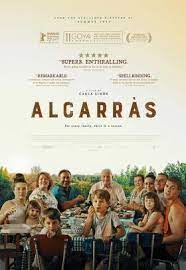
ALCARRAS
Spain, 2022, 120 minutes, Colour.
Jordi Pujot Dolcet, Anna Otin, Xenia Roset, Albert Bosch, Ainet Jounou.
Directed by Carla Simon.
Alcarras is a small town in Catalonia. It is a centre for agriculture, especially for stone fruit. This is a portrait of life in the town, in the orchards, families, the encroachment on the land by government, developers, and the setting up of vast solar panels.
The audience spends two hours mainly with a family, father and mother, the older son working in the orchard, the next daughter adolescent and self-conscious, and then a vigorous younger daughter who loves playing with her twin cousins and other children. The cast of the film is entirely non-professional (except for a sister of the writer-director, who plays one of the aunts). In fact, the performances seem very accomplished, the whole cast playing themselves with seeming professional aplomb.
We spend a lot of time with these characters, some audiences complaining that the story is repetitious, not always involving. Other audiences, including the jury at the Berlin film Festival 2023, was so involved that they awarded the film the top prize, the Golden Bear. For many audiences, especially those who enjoy documentaries about unfamiliar countries, they will be happy to spend these two hours in Catalonia, empathising with the characters (sometimes irritated by them), sharing the joys and the difficulties, the hard work, the picking of the fruit (and employing, when they can, some foreign fruit pickers from Africa…), family life at home, the annual festival in the town with song and dance. On the other hand, for audiences who like dramatic momentum, they will be perhaps wanting more.
The father is something of a tough patriarch. His wife is strong, gentle, supportive. The son is loyal but there is an underlying restlessness. The daughter is moody. The youngest girl quite vivacious and demanding. There are the twin cousins, the various in-laws, and the elderly aunts. Which means that the various generations of Catalonian life are well represented.
And the solar panels, being delivered, being laid out, the father of the family hostile, his relative an entrepreneur. And while there are scenes of joy in the village in celebration, there are also some powerful demonstration scenes against the companies, the picking of the peaches, transporting them to the city, shouts in protest, the pouring of the peaches on the road and driving over them to make the point. The other point is, of course, that with concern about climate change, the need for sun and wind for power, it means such developments as extensive solar panels to produce and channel energy. But, it is very disturbing at the end to see the machinery driving through the orchards, ploughing up the ground, destroying the trees.
The film offers an interesting opportunity to see and reflect on traditional families and the way they live and cope in the 21st-century but also to see the transitions in agricultural life, change for possible good, but some heartbreak in destruction.
1. The title, the town, Catalonia, agricultural, small town life, orchards and crops, modern encroachments?
2. The cast, non-professionals, the persuasive performances? Convincing?
3. The photography, beauty, the vistas of the town, the vistas of the fields and crops, the surroundings? Home life? Outings, village life, the celebration? The work in the fields, the harvesting? The protest? The cranes and the destruction of the orchards? The musical score?
4. The focus on the family, the father, age, relationship with his wife, the work on the orchards, the collaboration of the family, the different generations, the older patriarch and his life, the aunts, the same generation as the father, and the next generation, the teenagers and their reactions, work, moods, and the younger children and their play?
5. The orchards, the peaches, the workers, collaboration, the picking of the fruit, collecting? The farm and the machinery? The foreign workers, the marketplace? The father and his son working with his father?
6. Home life, old style, yet modern, the television, the music? The daughter, her age, the touch of rebellion, moods, practising her dancing – and ultimately refusing to join in the dense? The son, his age, friends, working with his father, prospects for the future? The mother, active, concerned, the household, support?
7. The old man, the past, his work, life, the generations, tired, sleeping? His role in the house? Going to the inn, playing cards with friends? Fragility?
8. The variety of aunts, the generations, their talk, remembering the past, work? The visitors from Barcelona?
9. Iris, forthright, with the twins, the other children, the range of games, make-believe and pretence, guns and sieges, the nature of play? The absence of the twins, the return? The mother and her concern, family alienations?
10. The change, the installation of the solar panels, the land being taken over, intervention of the government, the policy of energy production over crops? The father, his resentment, confrontations?
11. The choir practice, the celebration, everybody joining in the festivities, songs, performances? The Moody daughter and her refusing to join in? The son, his drinking, the accident and his father’s reaction?
12. The collecting of the peaches, the spilling, gathering, going to the protest, the farmers all joining, the demonstration, the placards, the authorities, the spilling of the peaches, driving over the?
13. The machinery coming in, digging up the fields, destroying the trees – for the solar panels?
14. The traditions of the past, the 20th century, developments in the 21st-century, and the threats to traditional agriculture and livelihoods?